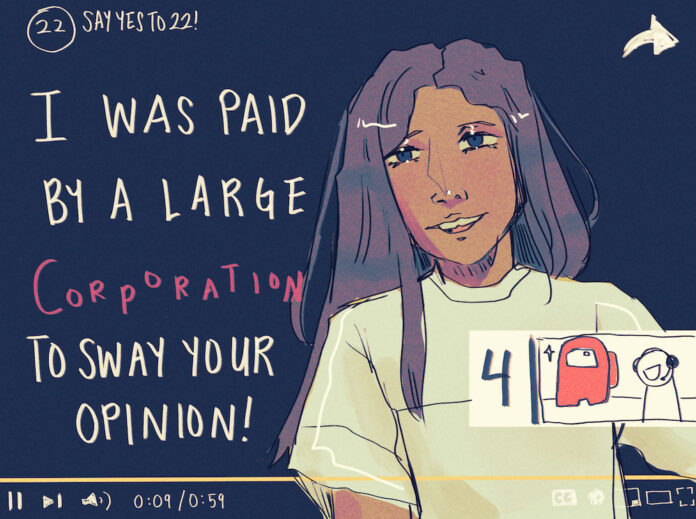I am a voter in California, and there has seldom been a time this election cycle when I have watched TV and not seen an ad trying to sway my vote one way or another, particularly concerning the 12 state propositions on the ballot. Of these, there is one message that has completely dwarfed every other when it comes to advertising: the Yes on Proposition 22 campaign.
Any Californian can attest to the TV commercials, social media advertisements and fliers that have been flooding our collective consciousness throughout the past couple of months. I even got a text message from “Alisha, a single mom & rideshare driver” urging me to vote yes on Proposition 22. Most of these advertisements have the same general message: Proposition 22 is overwhelmingly supported by app-based drivers like [insert name here] from [insert city here], a stay-at-home mom/retiree/full-time worker who just wants to make a little cash on the side and keep their schedule flexible. This pattern carries over to campaigns for other propositions as well. Across the board, it really seems like the little guy is getting involved, from dialysis patients to renters to… Seth Rogen? But this is exactly what advertisers want people to believe. In fact, these ads are a prime example of one of the more popular, controversial and incendiary practices in political advertising — astroturfing.
As the name suggests, astroturfing is the practice of obscuring the source of a movement to create the illusion that it has widespread popular support: essentially, fake grassroots. The term was coined in 1985 by Texas senator Lloyd Bentsen in response to hundreds of letters in support of insurance company interests. Traces of this practice go all the way back to Shakespeare’s “Julius Caesar,” where Cassius forges letters from the public urging Brutus to kill the titular emperor. With the adoption of the Letter to the Editor section in many newspapers and the eventual invention of the internet, this practice has become more prolific, more targeted and more persuasive. Astroturfing was created to trick people into believing their neighbors feel so passionately about a topic that they are willing to self-organize and make a political statement. According to attorney and political strategist Kris Parker, voters gravitate towards this type of community movement, whether legitimate or perceived.
This is the real danger of astroturfing. In imitating grassroots campaigns, corporations are coercing voters to vote with them under the guise of serving community interests. It’s not just corporations that are getting involved; Russian trolls have begun posing as grassroots activists on both sides of the aisle to try to divide voters and convince them not to vote.
The Yes on 22 campaign is a textbook case of astroturfing. The campaign advertises as if the proposition has widespread popularity by citing this survey that says 82 percent of ride-hailing service drivers in California support the proposed changes. However, upon further research, it is clear the survey isn’t reliable. This survey and all others of their kind were commissioned by Uber. Uber, Lyft and Doordash combined have sunk over $149 million into the Yes on 22 campaign, a significant contribution to the most expensive political campaign in California history. It’s easy to see why this is the case; the proposed law would reclassify their workers as contractors as opposed to employees. Proposition 22 would allow these companies to circumvent certain labor laws, such as minimum wage, worker’s compensation and unemployment insurance.
Proposition 22 is not alone. The campaign against Proposition 23 — which would require dialysis clinics to have a doctor on-site during treatment — features ads of dialysis patients claiming that their neighborhood clinics would be shut down if this proposition passed. Yet this campaign is almost completely funded by DaVita and Fresenius, the two largest corporate dialysis companies in the country. Proposition 21, which would expand local government’s ability to enforce rent control, has faced steep opposition from “a coalition of seniors, veterans, affordable housing advocates, labor & social justice organizations,” according to the campaign’s Facebook page. Yet right below that, it says where the money is really coming from: three large corporate real estate companies. In all three examples, corporations are out-spending their opponents to protect their own interests, often at the expense of everyday people.
The scariest part? It’s working. A recent poll from the Berkeley Institute of Governmental Studies found that 39 percent of likely voters in California support Proposition 22, while 36 percent oppose it. This same study also found that voters are evenly split on Proposition 21. The ads from these corporate interest groups are the ones that are constantly on TV, social media and in our mailboxes, and we are inclined to believe what we see and read. But it’s important to take their advertising with a grain of salt and recognize that these messages are coming not from your everyday Joe-schmo, but from corporations trying to protect themselves. In a time where misinformation is getting harder and harder to catch, it is incredibly important voters research not only what they are voting for, but who is campaigning for it. The source of campaign money shows a lot about who stands to benefit from legislation.
![]()




































